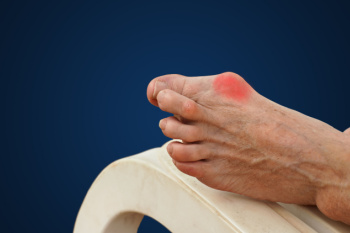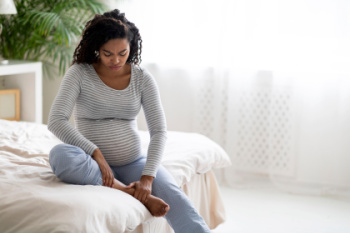Connect With Us
Blog
Items filtered by date: August 2024
Ankle Fracture? Don’t Wait for Treatment
Breaking Down Bunions

Bunions are bony bumps that form on the joint at the base of the big toe, causing the toe to deviate toward the others. This condition can be painful, particularly when wearing tight shoes or walking. Common causes of bunions include genetics, arthritis, foot injuries, and wearing poorly fitted shoes. Symptoms typically include swelling, redness, and soreness surrounding the big toe joint, along with visible deformity. Non-surgical treatments like wearing wider shoes and using orthotics can alleviate symptoms, while pain relief medications and stretching exercises may also help. In severe cases, surgery might be necessary to realign the toe and relieve pain. Complications can arise if bunions are left untreated, leading to chronic pain or difficulty in walking. Prevention strategies include wearing well-fitting shoes with ample toe space, avoiding high heels, and maintaining good foot care to reduce the risk of developing bunions. If you are experiencing discomfort from a bunion, it is suggested that you schedule an appointment with a podiatrist for appropriate treatment.
If you are suffering from bunions, contact one of our podiatrists of The Foot Center. Our doctors can provide the care you need to keep you pain-free and on your feet.
What Is a Bunion?
A bunion is formed of swollen tissue or an enlargement of boney growth, usually located at the base joint of the toe that connects to the foot. The swelling occurs due to the bones in the big toe shifting inward, which impacts the other toes of the foot. This causes the area around the base of the big toe to become inflamed and painful.
Why Do Bunions Form?
Genetics – Susceptibility to bunions are often hereditary
Stress on the feet – Poorly fitted and uncomfortable footwear that places stress on feet, such as heels, can worsen existing bunions
How Are Bunions Diagnosed?
Doctors often perform two tests – blood tests and x-rays – when trying to diagnose bunions, especially in the early stages of development. Blood tests help determine if the foot pain is being caused by something else, such as arthritis, while x-rays provide a clear picture of your bone structure to your doctor.
How Are Bunions Treated?
- Refrain from wearing heels or similar shoes that cause discomfort
- Select wider shoes that can provide more comfort and reduce pain
- Anti-inflammatory and pain management drugs
- Orthotics or foot inserts
- Surgery
If you have any questions, please feel free to contact our office located in Los Angeles, CA . We offer the newest diagnostic and treatment technologies for all your foot care needs.
What Causes Foot Pain During Pregnancy?

Foot pain during pregnancy is common due to several factors. Weight gain places extra pressure on the feet, leading to arch collapse and overpronation. Hormonal changes cause ligaments to relax, affecting foot stability and contributing to conditions like plantar fasciitis or Achilles tendonitis. Swelling, or edema, increases discomfort, often affecting the feet and ankles due to fluid retention. To find relief, pregnant women can elevate their feet when possible to reduce swelling and wear supportive footwear with adequate arch support. Stretching exercises for the calves and plantar fascia can alleviate tension and strengthen muscles. Using compression socks or stockings can also help manage swelling. A podiatrist can diagnose causes of severe or persistent foot pain and ensure appropriate management throughout pregnancy. If you are experiencing foot pain during your pregnancy, it is suggested that you consult a podiatrist who can offer effective relief solutions.
Foot Pain
Foot pain can be extremely painful and debilitating. If you have a foot pain, consult with one of our podiatrists from The Foot Center. Our doctors will assess your condition and provide you with quality foot and ankle treatment.
Causes
Foot pain is a very broad condition that could be caused by one or more ailments. The most common include:
- Bunions
- Hammertoes
- Plantar Fasciitis
- Bone Spurs
- Corns
- Tarsal Tunnel Syndrome
- Ingrown Toenails
- Arthritis (such as Gout, Rheumatoid, and Osteoarthritis)
- Flat Feet
- Injury (from stress fractures, broken toe, foot, ankle, Achilles tendon ruptures, and sprains)
- And more
Diagnosis
To figure out the cause of foot pain, podiatrists utilize several different methods. This can range from simple visual inspections and sensation tests to X-rays and MRI scans. Prior medical history, family medical history, and any recent physical traumatic events will all be taken into consideration for a proper diagnosis.
Treatment
Treatment depends upon the cause of the foot pain. Whether it is resting, staying off the foot, or having surgery; podiatrists have a number of treatment options available for foot pain.
If you have any questions, please feel free to contact our office located in Los Angeles, CA . We offer the newest diagnostic and treatment technologies for all your foot care needs.

